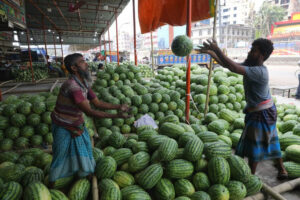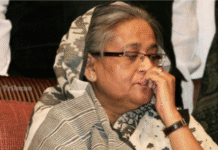By Ahammad Foyez on Apr 04, 2024 Benar News
Social media influencers in Bangladesh are claiming they succeeded in slicing the price of watermelon in half by organizing a two-week boycott, and are now targeting another pricey product: beef.
Bangladesh has a huge demand for watermelon during the summer months – March to June – and especially during the month of Ramadan when the parched and hungry faithful in the Muslim-majority country seek sweet and juicy fruits with which to break their daily fasts.
At the start of Ramadan, watermelon prices hit 700 taka to 1,000 taka (U.S. $6.37 to $9.10) for one of these giant fruits.
Social media groups joined together to form a consumer syndicate and call for the two-week boycott. Now, watermelons are selling for 350 taka ($3.18) each.
Jasim Uddin Khan, one of the key campaigners of the boycott movement, said such abnormal prices forced him and others to turn to social media, mainly Facebook.
“As watermelon is a perishable item, it worked quickly, we had success within just two weeks,” Khan told BenarNews, adding that many sellers were forced to dump rotted fruit because of a lack of customers, leading to price cuts.
Now, syndicate members have since shifted their focus to calling for a boycott of beef – another prized staple of Ramadan break-fasting feasts – but which has a minimum price of 700 taka per kg.
“I believe that the consumer syndicate would be successful in breaking the traders’ syndicate,” he said.

On Thursday, Md. Soliman Ahmed told BenarNews that he previously purchased a large watermelon for 300 taka ($2.73), but left without one last week when the seller demanded 750 taka ($6.82) for the same size fruit.
Md. Motaleb Hossain, a watermelon seller in Dhaka, said he went at least five days last week without making any sales, forcing him to dump at least 100 rotten watermelons.
Akter Mia, a trader in Dhaka’s largest wholesale market, Kawran Bazar, said the price of watermelon suddenly fell because of poor previous sales.
“We have no comment on the social media movement … now the price is very low. I think people are happy now,” he told BenarNews.
Muhammad Zaman, another consumer, is hoping the new boycott will have similar success.
“Now I am serious about boycotting beef as the previous protest worked. I believe beef prices will be reduced soon,” Zaman told BenarNews.

Abdul Bayes, a former professor of economics and vice-chancellor of Jahangirnagar University, said social movements could have positive impacts.
“This time social media boycott made an impact on the market. At the same time it made one thing clear that the government has failed to control the market,” he told BenarNews.
He said farmers did not benefit from the higher prices, adding that middlemen with strong political connections control the market.
Positive effect
Ghulam Rahman, president of the NGO Consumers Association of Bangladesh (CAB), welcomed the social media campaign, saying it brought a positive impact to the market. He said rising food prices were hurting consumers.
“Especially the lower or middle-class people – I cannot imagine how they are living. People are using their savings or borrowing to buy daily needs,” he told BenarNews.
He blamed the rising prices on the greed of some traders while noting business operators influence much of the government.
“There are many laws in the country to protect consumer’s rights, but as business people are dominating in parliament and government, there is no implementation of such laws,” said Rahman, who served as chairman of the Anti-Corruption Commission.
The state minister for commerce said food prices did not increase during Ramadan because of government monitoring, adding that authorities were working to keep the supply chain stable.
Ahasanul Islam Titu also noted the recent success of social media campaigners.
“See, the consumers’ role is very important to balance the market. We appreciate the social media campaigning,” he told BenarNews.










